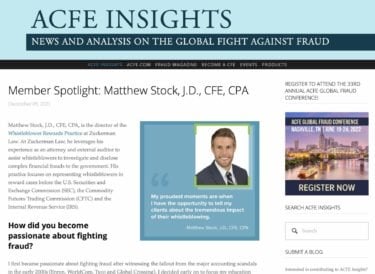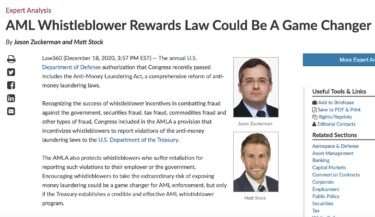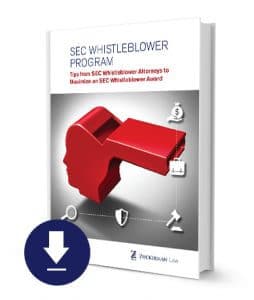
SEC Takes Aim at Anti-Money Laundering (AML) Program Violations
The SEC’s 2024 examination priorities clarify that the SEC continues to focus on AML compliance:
The Division will continue to focus on AML programs to review whether broker-dealers and certain registered investment companies are: (1) appropriately tailoring their AML program to their business model and associated AML risks; (2) conducting independent testing; (3) establishing an adequate customer identification program, including for beneficial owners of legal entity customers; and (4) meeting their SAR filing obligations.
Examinations of certain registered investment companies will also review policies and procedures for oversight of applicable financial intermediaries. Also, the Division will review whether broker-dealers and advisers are monitoring Office of Foreign Assets Control sanctions and ensuring compliance with such sanctions.
If you have original information about AML broker-dealer violations, contact our AML whistleblower lawyers at (202) 930-5901 or (202) 262-8959.
All inquiries are confidential. In conjunction with our courageous clients, we have helped the SEC halt multi-million dollar investment schemes, expose violations at large publicly traded companies and return funds to defrauded investors. We have secured multi-million dollar SEC whistleblower awards for our clients.






Recently the Association of Certified Fraud Examiners published a profile of Matt Stock’s success working with whistleblowers to fight fraud:
SEC AML Enforcement
In a July 2023 Risk Alert, EXAMS staff observed certain weaknesses in OFAC compliance programs, including instances in which entities did not adopt or implement reasonable, risk-based internal controls for
- following-up on potential matches with the sanctions lists and documenting the outcome of such follow-up;
- performing periodic or event-based screening of existing clients or customers based on, among other
things, changes in ownership or to the sanctions lists; and - conducting OFAC searches in a timely manner (or documenting that such searches were
completed).
The alert encourages registrants to review and strengthen the policies, procedures, and internal controls of their AML programs to further their compliance with federal AML rules and regulations, and to monitor for amendments, pursuant to
the AMLA and the Corporate Transparency Act.
SEC Whistleblower Program

Since 2011, the SEC Whistleblower Office has awarded more than $2 billion in awards to whistleblowers. The largest SEC whistleblower awards to date are:
- $279 million SEC whistleblower award (May 5, 2023);
- $114 million SEC whistleblower award (October 22, 2020); and
- $110 million SEC whistleblower award (September 15, 2021).
Anti-Money Laundering Compliance and SEC Whistleblower Awards
The primary anti-money laundering regulations require, among other things, the establishment and implementation of an anti-money laundering program, which includes, at a minimum:
- Policies, procedures, and internal controls reasonably designed to achieve compliance;
- Independent testing for compliance;
- Monitoring of the operations and internal controls of the program;
- Ongoing training for appropriate persons; and
- Appropriate risk-based procedures for conducting ongoing customer due diligence, which includes:
- Establishing, documenting, and maintaining a written Customer Identification Program; and
- Continuous monitoring to identify and report suspicious transactions.
In the event a broker-dealer identifies a suspicious transaction, the firm is required to file a SAR with the U.S. Treasury Department’s Financial Crimes Enforcement Network (FinCEN). In the SAR’s narrative section, broker-dealers must “[p]rovide a clear, complete and chronological description . . . of the activity, including what is unusual, irregular or suspicious about the transactions(s).” Broker-dealers violate Section 17(a) of the Exchange Act and Rule 17a-8 when the firms:
- Fail to file SARs; or
- File inaccurate SARs (e.g., incomplete narratives, incomplete critical field information, incomplete identification of suspicious activity, etc.).
These violations deprive regulators and law enforcement of important information that could be used to identify potential securities law and money laundering violations.
SEC Anti-Money Laundering Enforcement Actions
Alpine Securities Corporation AML Violations
On June 5, 2017, the SEC charged brokerage firm Alpine Securities Corporation (Alpine) with securities law violations related to its ineffective anti-money laundering program. According to the SEC’s complaint, Alpine failed to adequately file suspicious activity reports (SARs) for at least 1,950 stock transactions that the firm flagged as suspicious. Specifically, the SEC found that Alpine’s “records contained information reflecting material red flags of money laundering, securities fraud, or other illicit financial activities relating to its customers and their transactions,” yet Alpine “routinely and systematically failed to identify and report suspicious activity in its SAR filings.”
The SEC charged Alpine with thousands of violations of Section 17(a) of the Exchange Act and Rule 17a-8. The SEC requested that the court order Alpine to pay civil money penalties pursuant to Section 21(d) of the Exchange Act, which provides for penalties ranging from $5,000 to $500,000 for each violation depending on the facts and circumstances of the case. In addition to Alpine’s violations, the SEC’s complaint revealed that many of Alpine’s customers have also been charged with federal securities laws violations, including violations related to transactions that cleared through Alpine.
Raymond James AML Violations – $17 Million
In May 2016, FINRA fined Raymond James & Associates and Raymond James Financial Services $17 million for widespread violations related to their anti-money laundering programs. The violations stemmed from the firms’ failures to establish and implement adequate anti-money laundering programs, which resulted in their failures to prevent or detect, investigate, or report suspicious activity from at least November 2011 through June 2014.
Credit Suisse Securities AML Violations – $16.5 Million
In December 2016, FINRA fined Credit Suisse Securities (USA) LLC $16.5 million for “significant deficiencies” in its anti-money laundering program. According to FINRA, Credit Suisse’s program failed to effectively monitor/detect suspicious trading and money movements from at least January 2011 through December 2015. As a result, Credit Suisse was unable to determine, as it was required to do, whether SARs needed to be filed.
Oppenheimer & Company AML Violations – $10 Million
In January 2015, Oppenheimer & Company paid $10 million to settle an action by the SEC and FinCEN for failure to file SARs. According to the SEC’s complaint, Oppenheimer’s anti-money laundering program identified suspicious activity that needed to be “escalated” immediately. Specifically, the activity stemmed from an account that “(i) was a foreign broker-dealer doing business in the U.S.; (ii) selling ‘low-priced stock’ on behalf of customers; and (iii) that it immediately wired the proceeds out of the Oppenheimer account.” Despite these red flags, Oppenheimer failed to file SARs with FinCEN as required.
E.S. Financial Services AML Violations – $1 Million
In February 2016, the SEC fined E.S. Financial Services $1 million for violating anti-money laundering laws by “allowing foreign entities to buy and sell securities without verifying the identities of the non-U.S. citizens who beneficially owned them.” As mentioned, federal securities laws require broker-dealers to establish, document, and maintain a written Customer Identification Program.
Citigroup Inc. AML Violations – $70 Million
In January 2017, Citigroup Inc. paid a $70 million civil penalty for failing to meet the regulatory requirements related to its AML policies. The fine relates to a 2012 complaint that Citigroup’s AML safeguards were deficient and the bank was ordered to improve its policies. Thereafter, the Office of the Comptroller of the Currency (OCC) determined Citigroup had not come into compliance and failed in maintaining effective AML controls. This is Citigroup’s third AML fine in the past few years. In 2017, Citigroup paid $97 million after the bank’s Banamex USA (BUSA) unit violated AML rules and the Bank Secrecy Act. In 2015, Citigroup paid $140 million to settle other deficiencies in its AML program.
How to Get an AML Whistleblower Award
Guide to Anti-Money Laundering Act Whistleblower Rewards and ProtectionsAML Whistleblower Attorneys’ Expert Analysis About AML Whistleblower Reward Program
AML Whistleblower Law Firm
For more information about AML whistleblower rewards and bounties, contact the AML whistleblower lawyers at Zuckerman Law at 202-262-8959.
For more information about the SEC Whistleblower Program, see our eBook Tips from SEC Whistleblower Attorneys to Maximize an SEC Whistleblower Award. Click below to hear SEC whistleblower lawyer Matt Stock’s tips for SEC whistleblowers:
How Can Our SEC Whistleblower Attorneys Help You Obtain an AML SEC Whistleblower Award?
What are AML SEC Whistleblower Awards?
whistleblower_lawyers_012017_infographic
The Bank Secrecy Act (“BSA”), and implementing regulations promulgated by the Financial Crimes Enforcement Network (“FinCEN”) require that broker-dealers file SARs with FinCEN to report a transaction (or a pattern of transactions of which the transaction is a part) conducted or attempted by, at, or through the broker-dealer involving or aggregating to at least
$5,000 that the broker-dealer knows, suspects, or has reason to suspect: (1) involves funds derived from illegal activity or is conducted to disguise funds derived from illegal activities; (2) is designed to evade any requirement of the BSA; (3) has no business or apparent lawful purpose or is not the sort in which the particular customer would normally be expected to engage, and the broker-dealer knows of no reasonable explanation for the transaction after examining the available facts; or (4) involves use of the broker-dealer to facilitate criminal activity. Broker-dealers are required to file the SAR 30 calendar days after the date of the initial detection of facts that may constitute a basis for filing a SAR under the SAR Rule. 31 C.F.R. § 1023.320(b)(3). In cases where the broker-dealer cannot identify a suspect, it must file the SAR within 60 days of the initial detection of facts that may constitute a basis for filing a SAR.
The Bank Secrecy Act (“BSA”), and implementing regulations promulgated by the Financial Crimes Enforcement Network (“FinCEN”), require that broker-dealers file SARs with FinCEN to report a transaction (or a pattern of transactions of which the transaction is a part) conducted or attempted by, at, or through the broker-dealer involving or aggregating to at least $5,000 that the broker-dealer knows, suspects, or has reason to suspect: (1) involves funds derived from illegal activity or is conducted to disguise funds derived from illegal activities; (2) is designed to evade any requirement of the BSA; (3) has no business or apparent lawful purpose or is not the sort in which the particular customer would normally be expected to engage, and the broker-dealer knows of no reasonable explanation for the transaction after examining the available facts; or (4) involves use of the broker-dealer to facilitate criminal activity. 31 C.F.R. § 1023.320(a)(2) (the “SAR Rule”). Broker-dealers are required to file the SAR 30 calendar days after the date of the initial detection of facts that may constitute a basis for filing a SAR under the SAR Rule. 31 C.F.R. § 1023.320(b)(3). In cases where the broker-dealer cannot identify a suspect, it must file the SAR within 60 days of the initial detection of facts that may constitute a basis for filing a SAR.
Id.
Exchange Act Rule 17a-8 requires broker-dealers registered with the Commission to comply with the reporting, record-keeping, and record retention requirements of the BSA. The failure to timely file a SAR as required by the SAR Rule is a violation of Section 17(a) of the Exchange Act.
The BSA requires certain financial institutions, including broker-dealers and certain registered investment companies, to establish anti-money laundering (AML) programs that are tailored to address the risks associated with the firm’s location, size, and activities, including the customers they serve, the types of products and services offered, and how those products and services are offered. These programs must, among other things, include policies, procedures, and internal controls reasonably designed to achieve compliance with the BSA and its implementing rules; independent testing; and risk-based procedures to perform customer due diligence (as required by the Customer Due Diligence rule), which includes identifying and verifying the identity of customers and conducting ongoing monitoring to identify and report suspicious transactions. Where appropriate, certain financial institutions must also file Suspicious Activity Reports (SARs) with the Financial Crimes Enforcement Network. SARs can be used to detect and combat market manipulation, insider trading, Ponzi schemes, corruption, money laundering, terrorist financing, and a variety of other illicit activities potentially violative of securities and other laws and regulations.









